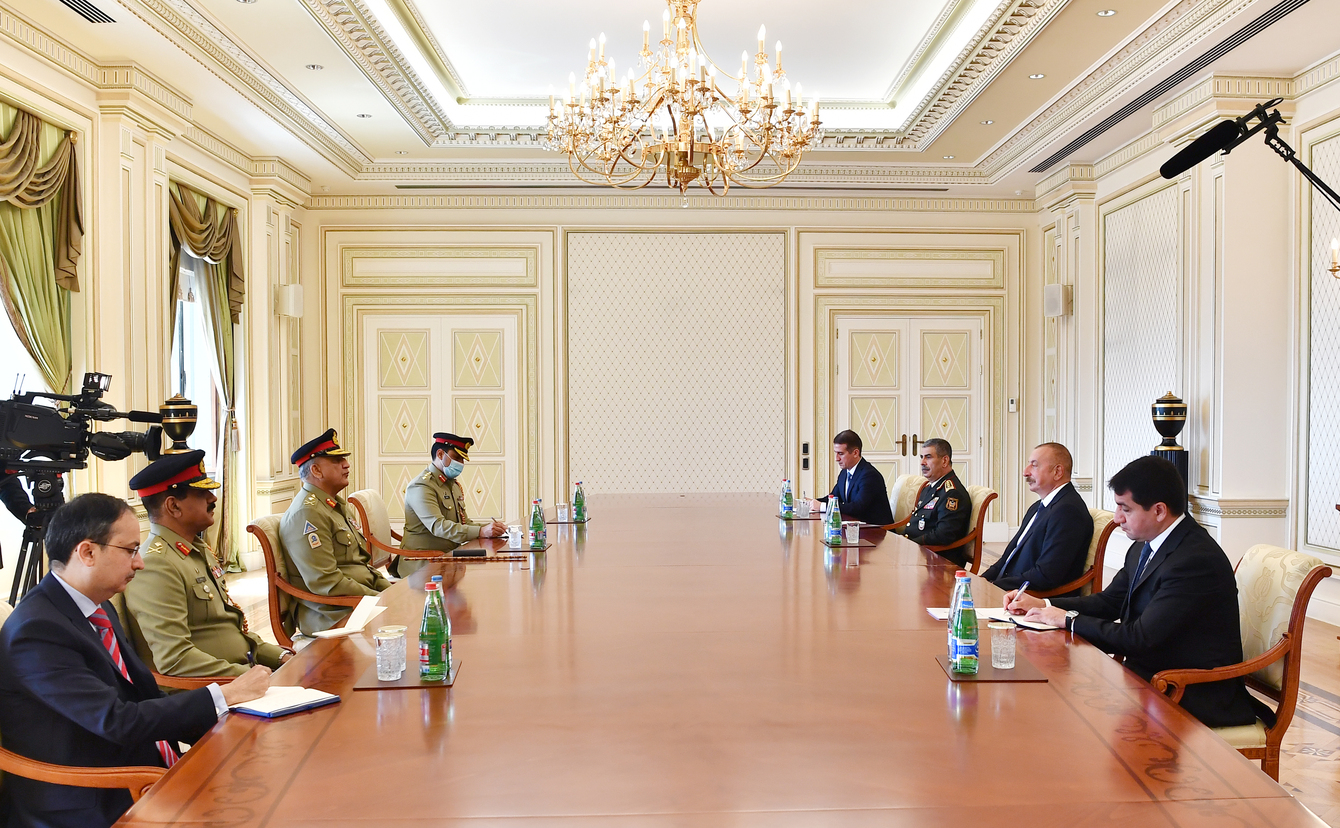Azerbaijani President Ilham Aliyev received Pakistani military officials in Baku on Monday to discuss mechanisms to further strengthen bilateral ties.
As part of the meeting with Pakistani Chief of Army Staff, General Qamar Javed Bajwa, President Aliyev welcomed Islamabad’s political support shown for Azerbaijan in the last year’s war with Armenia.
“I would also like to mention that Pakistan is one of the few countries that did not recognize Armenia because of occupation of our lands and did not establish diplomatic relations with Armenia,” President Aliyev said.
“This is another demonstration of brotherly relations between our countries. The Azerbaijani people know it. We always deliver the message about who supports Azerbaijan and who supported us during the war,” he added.
The latest outbreak of war in the region started on September 27, last year, after Armenia’s forces deployed in the occupied Azerbaijani lands shelled military positions and civilian settlements of Azerbaijan. The attacks triggered the Azerbaijani forces to take immediate counter-offensive measures for pushing back the assault. The war ended in a tripartite ceasefire statement signed on November 10 by Armenia, Azerbaijan, and Russia. By this time, Azerbaijani forces liberated more than 300 settlements, including the cities of Jabrayil, Fuzuli, Zangilan, Gubadli, and Shusha, from nearly 30-year-long illegal Armenian occupation. Armenia also returned the occupied Aghdam, Kalbajar, and Lachin districts to Azerbaijan by December 1 as part of its obligations under the ceasefire deal.
Pakistani authorities, including the country’s Foreign Ministry and National Army, voiced full support for Azerbaijan’s position on the Karabakh conflict during the last year’s war with Armenia. In addition, in an interview with the local media, Pakistan’s Prime Minister Imran Khan reaffirmed that the Karabakh region is an internationally recognized integral part of Azerbaijan.
Meanwhile, Monday’s meeting in Azerbaijan’s capital city also highlighted official Baku’s stance on the Kashmir conflict.
“As you know, Azerbaijan always supports Pakistan on the issue of Kashmir. Our straightforward position has been demonstrated many times. This position is based on justice, international law and our brotherly relations. We need to support our brothers in all the issues,” President Aliyev noted as part of the meeting.
The conflict between Pakistan and India in the Kashmir region sparked in 1947 after the two countries won their independence from Britain. The dispute fueled two full-fledged and brief wars between the sides in 1947, 1965, and 1999. Although a ceasefire has halted intensive fighting since 2003, it remains fragile amidst regular fire exchanges across the so-called Line of Control, a 450 mile-long (724 kilometers) military control line.
Today, Delhi and Islamabad both claim Kashmir as their own; however, neither country exerts complete control over the region. Partial rule of territories by the two countries is considered internationally as “Indian-administered Kashmir” and “Pakistan-administered Kashmir”. Pakistani authorities have repeatedly announced that Kashmiri people could either choose to be part of Pakistan or remain independent. Islamabad believes the dialogue and relevant UN resolutions should be the basis for resolving the conflict.
Azerbaijan took Pakistan’s side in the Kashmir conflict on various regional and international platforms.
In January 2021, foreign ministers of Azerbaijan, Turkey, and Pakistan met in Islamabad to issue a joint declaration that focused on various issues. In the document, the sides also voiced concern over “human rights violations and efforts to change the demographic structure of Jammu and Kashmir” and reiterated their stance for a peaceful settlement of the dispute “in accordance with the relevant UN Security Council resolutions.”







 Iran's senior military leaders described the drone and missile attack on Israel on April 14 night as “successful".
Iran's senior military leaders described the drone and missile attack on Israel on April 14 night as “successful".
 The number of evacuees from flooded areas in Kazakhstan has reached 97,852 people, including about 32,856 children since March 27.
The number of evacuees from flooded areas in Kazakhstan has reached 97,852 people, including about 32,856 children since March 27.
 Iranian President Ebrahim Raisi warned Israel that it would face a "real and extensive" response if it makes any "mistake" following Tehran’s missi...
Iranian President Ebrahim Raisi warned Israel that it would face a "real and extensive" response if it makes any "mistake" following Tehran’s missi...



